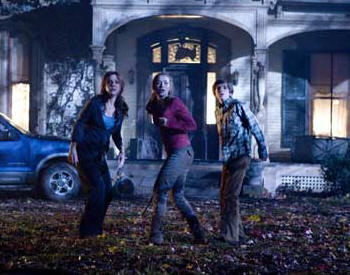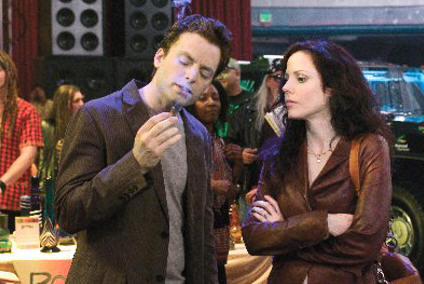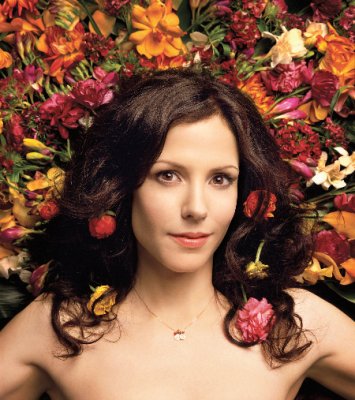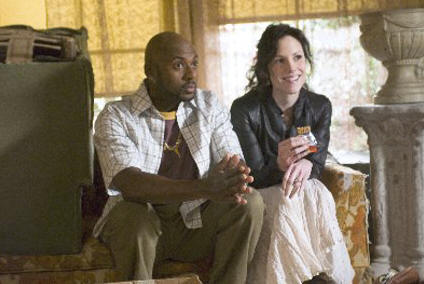Copyright ©2008 PopEntertainment.com. All rights reserved.
Posted:
February 12, 2008
It may have required an
intoxicant for actress Mary-Louise Parker to play the perplexed mom who
learns about The Spiderwick Chronicles the hard way – through an
attack from goblins – she eventually gets a handle on the fantastic
situation behind this incredible tale. Parker is no stranger to playing a
distraught mom who has to rise to the occasion; as the star of the TV hit
Weeds she plays a mom who has to solve extraordinary problems in a
decidedly different way as well.
In The Spiderwick Chronicles, mom Helen decides to move to her
long-disappeared great-great-uncle's run-down Spiderwick Estate with twin
sons Jared and Simon, as well as older daughter Mallory. There they find
themselves pulled into an alternate world full of faeries and other
creatures. Uncle Arthur had made a catalogue of a parallel world's
inhabitants' in doing so he unleashed the ogre Mulgarath and his ferociously
evil goblins who want to use his guide to take over both the normal world
and this other universe. When twin Jared finds the guide, he draws the
attention of the evil ones and a great battle ensues.
Based on Tony DiTerlizzi and Holly Black's wildly successful book series,
the film moves breezily through the able direction of Mark Waters, better
known for his work as the director of Freaky Friday and Just Like
Heaven. Just as Waters is a vet with a varied history, so is Parker.
Born in South Carolina, the 43 year-old former Army brat grew up in places
as diverse as Arizona, Tennessee, Texas, Thailand, Germany and France. After
acting in high school and college, she moved on to many stage and screen
productions. By 1990, she earned her first Tony Award nomination for her
performance in Craig Lucas' Prelude to a Kiss. She been in such films
as Naked in New York, Grand Canyon, Mr. Wonderful, Bullets Over Broadway
and Red Dragon. She has had a recurring role in the acclaimed series
The West Wing and won a Golden Globe for her leading role in the
Showtime's series, Weeds.
What was it like working with the youthful, remarkably talented leads and
faux siblings Freddie Highmore (playing twins Jared and Simon Grace) and
Sarah Bolger as sister Mallory?
I think they're really rare kids. I guess they aren't really kids anymore.
You just really keep your fingers crossed for them because it's such a hard
– the odds are so tricky in this business for kids. And they're really
uncommon, both of them. He has this bizarre kind of elegance for a young
man. She's sweet and it's genuine. With both of them, it's completely
genuine. They both also have this kind of lack of ego, which is shocking.
It's really shocking. I mean, they're like little movie stars. They have
great parents, so I'm sure that's part of it. They're amazing.
 Does
working with teenagers on this movie and on Weeds prepare you for
raising your kids when they become teens?
Does
working with teenagers on this movie and on Weeds prepare you for
raising your kids when they become teens?
I hope it won't go like that. You just never know what's going to happen
with kids; they're all so different. All you can count on is that they're
going to surprise you all the time, and they are their own people. You can't
control them really. You can't control what they do or say, and that's what
makes them so wonderful and so frustrating, complicated and amazing.
When you're
working with teenagers who are so professional, does their age even
register?
Not really. I had to stop myself from saying stuff sometimes because you
forget they're kids and you think, “Oh, don't say that.” But they're like
grownups in a way but also what's so great about them is that they are kids.
They're not creepy little… because I've worked with those before and they're
really scary and you worry for them because it doesn't always end up okay
for them.
You have high
hopes for them?
I do, I do.
What was the mission statement for your character? Did the director Mark
Waters or the writers need a more grounded force within all of the fantasy?
Did they set it up for what they wanted out of you?
Um, they didn't really. I don't think I ever got anything. I think he just
said he wanted me to play it [laughs].
What do you think was her relevance to the story?
I liked that she was just sort of wildly imperfect and struggling, and the
kids were... well, everyone was kind of struggling, and she was part of the
struggle. I think that when they unite at the end, it made that more
poignant in a way, whereas if she had just been the mother standing by the
stove in all of her perfection, I don't know if that would've resonated
quite as well. But I think because, in a way, they were almost disparate and
they came together, that made it sweeter.
Would you have bought into the fantasy sooner as yourself instead of as
the mother who is clueless of what's happening until it hits her over the
head?
Yeah, I would've. I would have been like, let me see through that thing!
Probably. Yeah.
You have two distinctly different takes on suburban moms. You could have
had your character on Weeds selling pot to this mom.
Yeah, she could've used a big fat one, right?
 As
far as playing these two variations of suburban moms, did it ever resonate
that you're playing two different aspects or scenarios of suburban mom-dom?
Were there any thoughts on how they are different?
As
far as playing these two variations of suburban moms, did it ever resonate
that you're playing two different aspects or scenarios of suburban mom-dom?
Were there any thoughts on how they are different?
Not really, I try to wipe the Etch-a-Sketch clean, you know. I just try to
start blank, because I feel like you only have so many tools and I just want
to be as specific as I can. I'm not a magician, but I want to bring
something to it that's different and that feels true so that people can
watch it and feel like they're watching a person and not an actor, you know?
So I don't really compare to other characters.
How was working in front of the green screen?
It's really weird. Really, really strange. Not only is it a gnome
[supposedly attacking you], but it's a hypothetical gnome. It's like an
invisible gnome. You just have to tap into the esoteric feelings of fear
instead of the literal, actual goblin itself.
They say that being a stage actor helps in working before a green screen.
That's true in some ways. You're used to having to suspend the disbelief in
a way, but there's also a fourth wall on stage that you don't have in film.
You can see an electrician standing behind the camera. In theater you get to
invest yourself fully and you can disappear into a world and no one can stop
you for two hours.
In film, it's just a little bit trickier. So in some ways, I think that's
true, absolutely. But other ways, I think it's hard to invent a gnome in
your head, like really hard! But it's like with Shakespeare – anything you
have to elevate, that you have to find, that you have to summon or you have
to conjure, you have to rely on technique a little bit more that you can
rely on just personalizing something.
Was there a lot of rehearsal?
There was not much rehearsal. There was some, for sure. There was some of
that in terms of blocking, but I don't know if I would call that rehearsal
necessarily, but there was more detailed blocking.
Good thing you have Spiderwick... coming out; did the writer's
strike affect Weeds?
They made a deal with Lionsgate, so it was fine and we'll be shooting, I
guess, by the end of April. So it's all right.
Were you able to do some stage work in the mean time?
I'm doing a play right now at Playwrights Horizons. We go into previews on
Friday, speaking of goblins. It's called Dead Man's Cell Phone.
And it was written by?
Sarah Ruhl. It's her new play directed by Anne Bogart. Two really, really
interesting women – which is why I wanted to do the job. It's a rather
abstract piece…
How does that work with your schedule?
Well, I knew that I had time to do a play, because I really needed to. It's
the longest I've gone since I was 17 without having done a play, and I
[needed to] desperately. It's been three years and I really needed to do a
play so badly, so I knew had this little window to do one. I'm hoping to do
one next year as well and not take so long in between because it's hard.
What is it about doing a play that reinvigorates and recharges you as an
actor?
It's just great and it's just fun. My girlfriend said once, she was playing
Nina, and she said that it made her feel like an acting athlete. Made her
feel in shape, and sharp, and smart, and capable and that's what it does
really, because when you're honing a performance for the 25th time or the
100th time or the 400th time, which I've done. The 450th time I did a play,
and then on to the 460th, and it's really great.
You just feel really powerful. Your mental acuity – everything feels just
really sharp. You just feel more in control of your performance, obviously.
And creative. When you feel creative, you feel alive, right? It just gives
you a certain kind of joy that, you're going to work everyday and you're
just trying to do a good job. You feel like you just may be just achieving
as best you can, but not really elevating it. But when you feel like you're
actually creating something, that's a really great feeling. It just doesn't
happen.
It doesn't sound like work when you're doing a play.
It's arduous, but it doesn't feel like labor.
 Do
you think of movies as labor?
Do
you think of movies as labor?
I have a blue-collar ethic towards my work anyway I think. I don't think of
"career." Film to me feels more like punching a clock a little bit.
How does playing the same character on a TV show differ from playing the
same character on stage?
It's funny because it's harder with TV because there are different writers.
Sometimes there are different writers every year. I come in and I go, “But
she was home-schooled, how can you write that she doesn't like…” Or “She
hates tea!” Or “She doesn't wear flip-flops, how can …” Or “She HAS slept
with a woman, so how can I say…” I have this whole back-story going, so I
have to go in and make it work in my head. Or I forget or I'm lazy and I get
mad at myself, or I feel like I'm personalizing everything.
It's hard, whereas if you're doing a play, it's there. There's the frame.
It's like, you're just going over the… It's not like impressionism, you know
– the brushstrokes are there. You go with what's there.
Do you know where your character on Weeds is going?
Sometimes they change their mind.
Do you get to have input at all?
Hmmm, I have it anyway, even if I don't get to.
 Where
would you like her to go?
Where
would you like her to go?
I just like it to be bold, perverse, ugly and hard. I like her to be in a
hard situation. It's just more interesting to me if she's in some sort of
emotional stasis instead of coping, like “I'm doing the dishes and going
shopping.” She needs to be backed up against a wall. It's just more
interesting, more fun. And I like it to be new and fresh.
How does that affect your film choices?
Well, I'm 43 so I don't get, like, 600 choices of whatever film I want to
do, but I think being on a TV show certainly does give me more opportunities
than I had before. Because people recognize me a little bit more. I just try
to do what will give me enough time to spend with my kids. So I have to turn
things down sometimes.
Do you do this sort of film for your kids so they can see your work as
opposed to your other, sometimes more racy or provocative, stuff?
Yeah, exactly. I wanted to do a kid's movie at some point, and I thought
this one was different. And it's just a little off so I liked that. I knew
Freddie first, he was the first name that I heard of, and I thought he was
amazing, and David Strathairn [who plays Uncle Arthur] we were friends. That
just made it all really attractive to me.
So you don't have another film project in the works?
I don't.
Email
us Let us
know what you
think.
Features
Return to the features page.